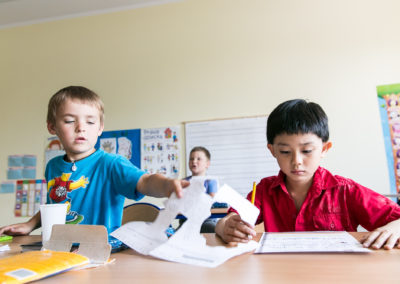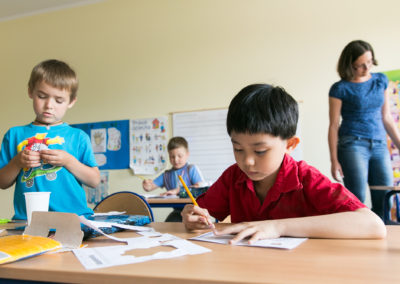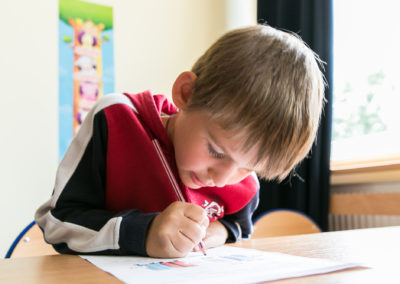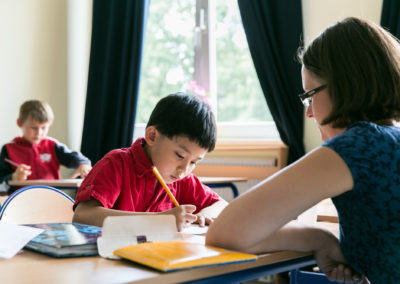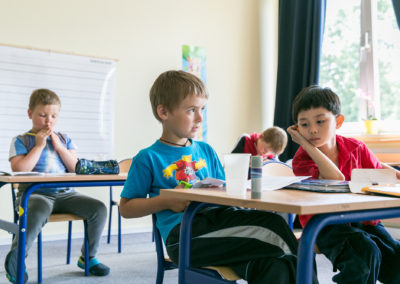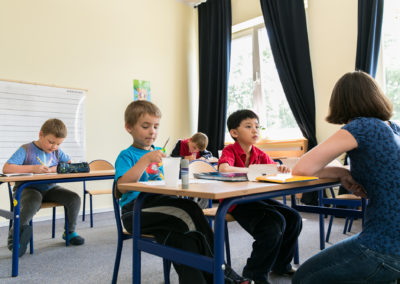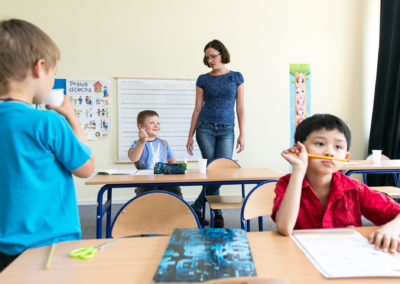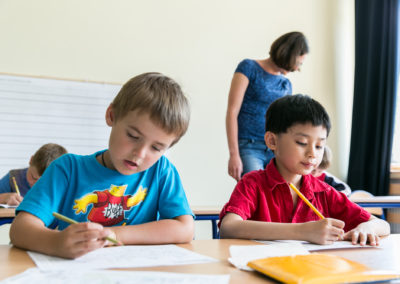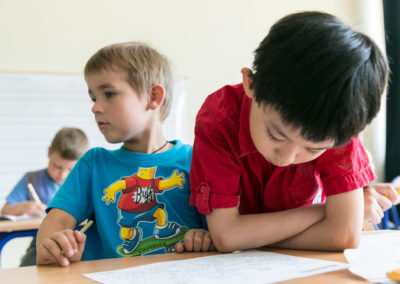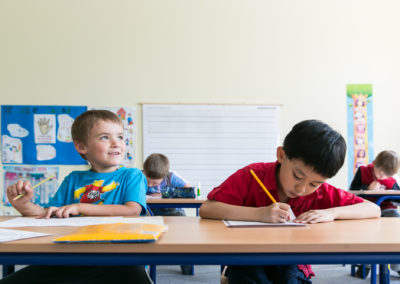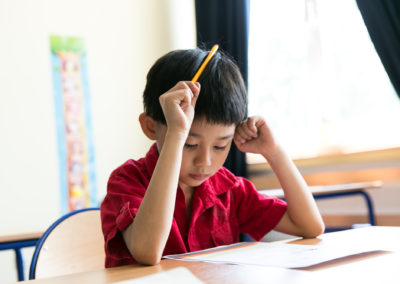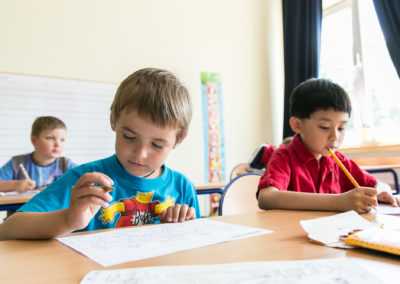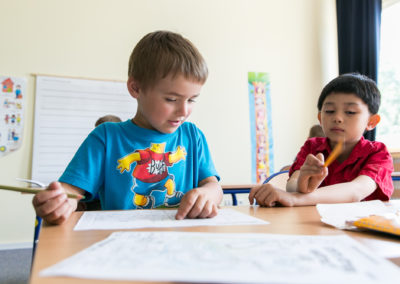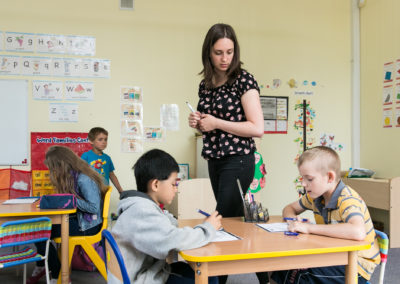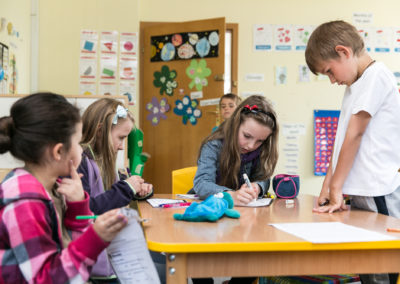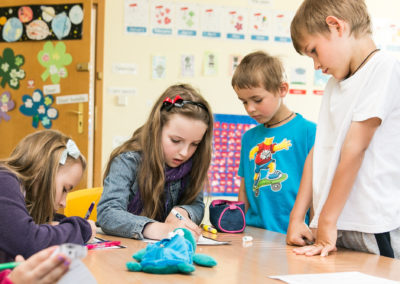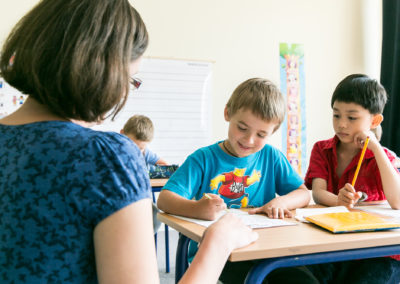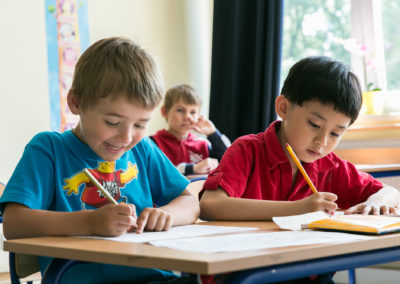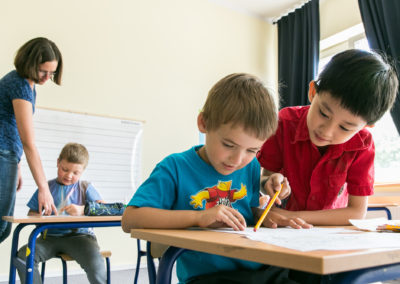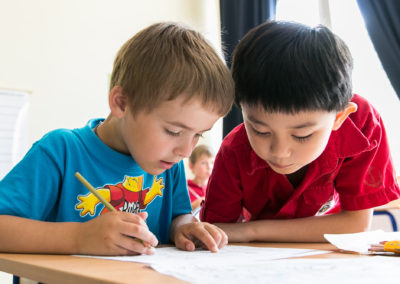Education
In addition to the traditional role of passing on the knowledge, teachers assist the child in an independent search for information, support in tasks and problem solving and motivate the group to do independent projects.
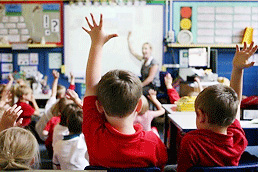
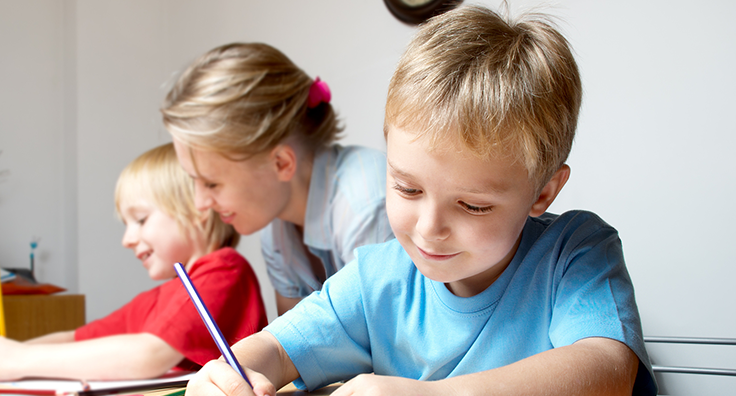
Education in Polish
Curricular classes in Polish are conducted in classrooms equipped with reading and computer centres that enable the students to seek for information independently. The relaxation area is also provided.
In the first stage of education (grades 1 – 3) classes in Polish include:
- Polish language education
- Mathematical education
- Social education
- Environmental education
- Musical education
- Artistic education
- Computer classes
- Technical classes
- Physical education
In the second stage of education (grades 4-8) classes in Polish also include:
- Polish language
- English language
- Music
- Art
- History and society
- Mathematics
- Computer classes
- Technical classes
- Classes with form teachers
- Physical education
- Biology
- Chemistry
- Phisics
- Geography
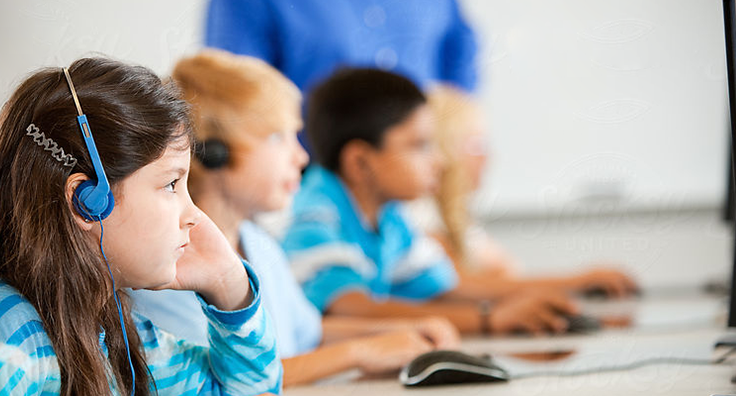
Education in English
Immersion Method
English language classes are organized on the basis of the proven method of Immersion involving the natural contact with the language. Language is the tool needed to acquire knowledge; the learning takes place during classes organized in Educational Themes
British Columbia Canadian Curriculum
What was the curriculum of British Columbia?
For many years, British Columbia used a more traditional model of curriculum called the Prescribed Learning Outcomes (PLOs). For every grade, in every subject, there were a list of mandatory topics and goals to be covered by every student. Teachers were responsible for ensuring that every student met every goal every year.
What is the new curriculum?
British Columbia’s new curriculum, currently called the Draft Curriculum, is progressive and flexible. Teachers are expected to teach all of the core subjects, as before, while striving to meet six “core competencies” in each subject area. Teachers are also expected to design most of their materials to be inter-disciplinary, meaning that mathematics may involve writing, history science, and physical education may involve community projects.
What are the “Core Competencies”?
Communication – this is the most important competency to focus on at the primarily language teaching. Communication involves building vocabulary, fluency, and understanding in oral language; legible and coherent writing skills; and reading skills.
Creativity – we strive to provide materials that are adjusted to our students interests and challenge them to think about abstract concepts. Assignments are intended to encourage “thinking outside the box” or expressing one’s individuality.
Critical thought – we discuss the motivations of characters in a story, analyze advertisements, act out difficult scenarios, and consider a wide range of materials that may be considered “above-level” in order to develop objective reasoning skills.
Positive self- and cultural-identity – by writing and speaking about ourselves and our family’s history we begin to understand who we are in the present. By learning about the histories of various cultures and the modern identities of other nations we carve a place for ourselves in the world.
Personal awareness and responsibility – this is largely taught through our daily routines, classroom and school rules, rewarding hard-work and kindness, and setting consequences for inconsiderate behaviours.
Social responsibility – we participate in our community, help those less fortunate, and set high expectations for pro-social behaviours. Furthermore, as a school, we strive to benefit our school community by working together to meed difficult goals and our local community through action
English teaching involves daily speaking and listening, reading and writing, and weekly drawing and viewing activities, spelling, sentence construction, formal grammar lessons, reading comprehension, creative writing, critical reading and viewing, listening activities, and drama
We teach vocabulary-dense Mathematics. This means that all mathematics activities that we do in our classroom are intended to also benefit speaking, listening, reading, and writing skills as well. This includes patterns, measurement, geometry, and finance as well as short-term mini-units on specific weaknesses.
We teach Social Studies (history, cultural studies, community involvement) and Science. Again, all of these “special subjects” classes are designed to specifically benefit our students oral and physical language skills (as above).
Regarding “special subjects”
We poll our students on what they enjoy, what they want to learn, and what the don’t like. Additionally, at the beginning of each year, we poll our new students on what they would like to learn. Using this information we design our special units to fit the specific, shared interests of our students. These are the four main groupings of interests that our students express:
- Geography, cultural studies, travel
- Space
- World exploration
- Animal diversity, Earth science, the environment
Each year We design four 2-3 month long units on the main areas. For each of these four areas we design, and compil resource packages and educaitonal materials.
These “special subject” units you can find in no other school, as they have all been specially designed to fit the interests and competencies of our students.
Closing remarks and resources
The British Columbia draft curriculum allows teachers to deliver content that students are movivated to learn about and challenges teachers to continually take ownership for their own development. Traditional methods such as spelling practise, reading comprehension, and repetitious games have not been “thrown out” but they are supported by more progressive learning opportunities such as the currently closing Space unit. Although we cannot know what world our students will be entering into when they complete their secondary education in the next 6-12 years, we can attempt to instill them with the skills to learn about and adapt to anything. Furthermore, by setting high academic and behavioural expectations, we guide our students toward positive personal and social functioning.
Curricular education (implemented in stages I and II) in English:
- Language classes
- Mathematical classes
- Environmental classes
- Art classes
- Musical classes
- IT programme
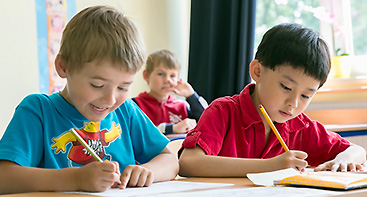
Students’ and parents’ support
We offer help through:
- remedial classes
- corrective and compensatory classes
- classes preparing for the eighth-grade exam
- Polish language for foreigners
- psychological help
Download
Class schedule
Class schedule for 1-8 grades
Regulations
Rules and Regulations of the “Vancouver Schools”
Statute
Statute of the “Vancouver Schools”
Grading system
Internal grading system of the “Vancouver Schools”
Contact data

Elementary school warsaw
Bilingual elementary School Warsaw, English language primary school Warsaw
1. primary school 2. elementary school warsaw 3. bilingual elementary school 4. bilingual primary school warsaw
Contact us



